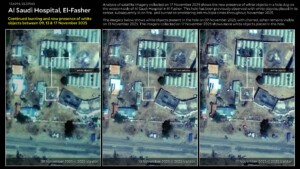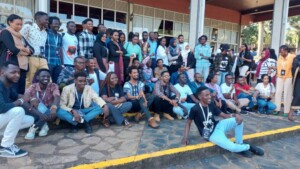Interview: Will Al Bashir face ICC in The Hague or Sudan?
The case of deposed Sudan dictator Omar Al Bashir has been a prominent international criminal case for years. It is not only about the mass victimhood, but it is also about international justice, ending impunity, and the protection of fundamental human rights values. Given the recent conflicting statements of Sudanese government officials regarding the decision of transferring Al Bashir and other ICC suspects to The Hague, Mohammed Elgizoly Adam of Radio Dabanga interviewed one of the leading international criminal law scholars to shed some light on the issue.
 Prof Brianne McGonigle Leyh (Picture supplied)
Prof Brianne McGonigle Leyh (Picture supplied)
The case of deposed Sudan dictator Omar Al Bashir has been a prominent international criminal case for years. It is not only about the mass victimhood, but it is also about international justice, ending impunity, and the protection of fundamental human rights values. Given the recent conflicting statements of Sudanese government officials regarding the decision of transferring Al Bashir and other ICC suspects to The Hague, Mohammed Elgizoly Adam of Radio Dabanga interviewed one of the leading international criminal law scholars to shed some light on the issue.
Prof Brianne McGonigle Leyh is an Associate Professor at the Netherlands Institute of Human Rights (SIM) within the Faculty of Law, Economics and Governance of Utrecht University, and an attorney specialising in human rights, victims’ rights, accountability for serious human-rights violations, and transitional justice.
The recent statement of the Sudan transitional government that they are willing to hand Al Bashir and other suspects to the International Criminal Court (ICC) needs clarity. The ICC relies heavily on the principle of complementarity and states parties’ cooperation. What nature and scope of cooperation might Sudan be willing to offer? Will Sudan have some discretion in the trial proceedings? What is the complementarity principle and its complications on Sudan's decision on whether Al Bashir and the other indicted will stand trial at the ICC in The Hague or in Sudan? These are some of the questions that have been asked.
Listen to the interview (MP3)
Read the full interview below:
RD: Given the recent developments in the case of Al Bashir, it will be great if you can start by briefly explaining the complementarity principle. What does it mean and to what extent can Sudan have the discretion to determine anything about the case of Al Bashir and the scope of cooperation?
Prof Leyh: If a court is based on the principle of complementarity, this means that a case of international crimes is preferably dealt with by the domestic prosecution, and the international criminal court should be seen as the last resort. So, in an ideal situation domestic jurisdiction should be willing and able to prosecute individuals for serious international crimes. Article 17 uses the words ‘willing’ and ‘able’ to look at the notion of complementarity. It sounds very simple, but in fact the Court in my view has perhaps complicated the situation more than they need to. It has interpreted this notion on whether states are willing and able to prosecute specific individuals for specific crimes quite narrowly in my view . So they have determined that it needs to be the same facts and crimes that have been looked at by the international court.
RD: It seems the ‘willing’ part in this equation is easier to prove, but in the case of Sudan, how can Sudan prove that it has the capacity and ability to try a case with such a high profile as Al Bashir’s?
Prof Leyh: If we look at the willing element, it looks as if the government, and also from the will of the people, is willing to prosecute Al Bashir and others for the crimes that they are alleged to have committed between 2003 and 2008 in Darfur. In terms of ability, what the court will look at is: when has Sudan criminalised the core crimes, international crimes. So, did Sudan criminalise war crimes, crimes against humanity and genocide, and specifically the one for which Al Bashir and others are charged? They are going to see whether he can be charged for crimes against humanity, of murder, extermination, torture or rape. If those international crimes are not codified in the criminal statute of Sudan, then that will be an argument for saying that they are not able to prosecute these crimes.
RD: What about the independency of the court, judges and lawyers? And the possibility of guaranteeing the right to a fair trial?
Prof Leyh: They will look a little bit in terms of structure and whether there is a functioning court system, but they don’t carry out a full analysis on whether a fair trial would be able to take place, which in my opinion is a bit of a shame. What they did in Libya, when they were looking at the principle of complementarity there, they were very concerned that in fact, the accused individuals don't have a fair trial at all, and there was a lot of information and evidence to point to that. In its decision the court actually said it was not a human rights court. What they were trying to say by that, was that it is not their judgment in high manner of fair trial standard of domestic system in terms of ability element of complementarity principle. They will look to see if there is a functioning court system at least. If they follow what they did in Libya, they will not carry out a full analysis whether the accused will receive a fair trial beyond some basic check.
RD: So basically, the primary issue here is whether the crimes in question such as war crimes, crimes against humanity, and genocide are criminalised under the Sudanese legal system, right?
Prof Leyh: That is one of the primary points. Also, they have to show that they can carry out investigations or that they are undertaking investigations. But again, this is not really a thorough review done by the judges. As long as they can point to a functioning court system, and crimes have been criminalised, and there is an investigative team looking at specific crimes that the ICC was looking into, then, in general that should be.
RD: The competence and the independence of the lawyers and judges is not the fundamental issue here?
Prof Leyh: It is brought in, but the ICC, as it said, is not acting as a human rights court, and they are looking to see justice will be handed out at the standard that it try to implement justice.
RD: As you know, the government of Sudan recently issue a statement that they are willing to hand Al Bashir over to the ICC, however, based on the statement it is unclear whether they will hand Al Bashir over to stand trial physically at the ICC. Later on, the government clarified that they have proposed three options. The first options is for the ICC to come and carry out the entire trial procedure within Sudan. The second option is to have a hybrid court, by both the government and the Court. The third option is to hand over Al Bashir to stand trial at The Hague. The question is whether there is a possibility of a hybrid court under the Rome Statute?
Prof Leyh: It certainly has never been done, but if an ad hoc court is established – not necessary in cooperation with the ICC but with the African Union – or if a specialized chamber is created within the domestic system, the same discussion we had on the complementary principle would apply. So, the ICC could say: look, we see that you are willing and we see that you are able to create an ad hoc specialised court, so that could happen.
RD: So it is possible for the ICC to carry out the trial procedure within Sudan, right?
Prof Leyh: Yes, the Rome Statute does allow for institute proceedings that it has never done before. There have been some attempts to carry out some proceedings. Actually, in each case that has been attempted, either the court has found it too unsafe, or not efficient or effective, so it has not happened yet. Perhaps this could be the first time.
RD: What about the victims and their expectations, has that been taken into account in the cooperation between the Court and state?
Prof Leyh: If there is a notion to institute proceedings in Darfur or Sudan, the legal representative of the victims, and also the office of public council for victims, will certainly first try to get an idea of what their constituents will want. Then, in many cases, they will support institute proceedings, arguing that in that case the proceedings are closer to the victim, so it gives victims greater access, and greater awareness on how these court proceedings operate. But the court will look primarily to security and safety concerns. If they don’t feel that the safety situation is as it should be, they would not move forward with the institute proceedings.
RD: In Sudan we have conflicting views with regards to whether or not Al Bashir should be handed over to the ICC. For some people it is about the sovereignty of the state and the Sudanese people. For some people it is about the acknowledgement of what they have gone through. For other people he might only get a fair trial if he is to be transferred to The Hague. What are the advantages and disadvantages of having Al Bashir standing trial at the ICC? Is it beneficial to the Court, or to Sudan, as a country that just came out of 30 years of dictatorship?
Prof Leyh: Well, that is a big question. I agree that in any criminal case about mass atrocities there is going to be a very symbolic element attached to it, simply because of the nature of these crimes and the massive number of victims. So, these type of trials, they really have this expressive function, where you know they can express the outrage of the international community about these crimes. It shows the world that, although we did not help when we needed too, we now recognise the suffering of the victims. Certainly that is part of it, but I think there is a number of challenges that the court will face in this case. The arrest warrant that was first issued, was issued at a time when the Court's office of the prosecutor and the investigative team were not allowed to the country. So, the groundwork of the investigations was really done in refugee camps in Chad and based on human rights NGOs reports and other documents. I think one of the challenges for the office of the prosecutor will be to make sure that all the dots are in a row, to really make sure that they have strong cases on all of the charges that are included in the arrest warrants, and to potentially amend the arrest warrant if needed, based on new access to individuals. The original arrest warrants were issued a long time ago and then the Court didn't really have direct access to the country.
So, I think there are a lot of challenges that the Court faces if the Al Bashir case were to go to The Hague. From a political point of view, it will be a big deal for the ICC to be able to have Al Bashir stand trial in The Hague. The arrest warrants on the situation in Darfur were based on Security Council referral. And yet, for how many years was Al Bashir able to travel quite widely? They have a prominent case against Jordan, as a state party to the Rome Charter, for not having arrested Al Bashir. Yes, I think for the Court it will be a positive thing [to try Al Bashir in the Hague]. It will show that the Court does go after the top people, including head of states. But it will be a challenge. I think the [Court's] office of the prosecutor is working very hard to make sure that everything is lined up as it should be.
RD: The government of Sudan actually proved its willingness to try Al Bashir, showing some reluctance to do so at the same time. But as you know, justice is a very broad concept and a subjective one as well. For example, for the victims in Darfur, justice is that Al Bashir will stand trial at the ICC, it is that symbolic. On the social media in Sudan, it looks unclear whether Al Bashir will physically stand trial at The Hague, or whether there will be some sort of cooperation between Sudan and the Court.
Prof Leyh: The ICC is really dependent on states to transfer him to ICC's custody. So, until the Sudanese authorities are willing to do that, the ICC really cannot do anything. It can operate under this notion of positive complementarity, which means that it proactively cooperates with Sudan to help ensure that Sudan could meet that ability standard under the principle of complementarity. But I don’t know to what extent it is doing that.
I certainly think that a number of European states would look favourably on Al Bashir’s transfer to The Hague. They have been long-time supporters of the ICC. I think that if Sudan is looking to gain favour politically from European states, it could be a show of good faith: we recognise that there is an arrest warrant from the Court, we transfer him, we state that we are willing and able [to try him], but we leave it to the Court to decide. This might ultimately be in Sudan's interests. It could also be in Sudan's interests to have him out of the country, and have other parties to do the prosecuting. The government can then focus on other transitional measures and other rule of law measures that need to be put in place.
RD: So, we can actually say it is for the benefit of Sudan if the state of Sudan is willing to hand him over to the ICC?
Prof Leyh: I think there are both benefits and drawbacks. I mean, there are some benefits, but the drawback is that the state can lose all control over the process. If they are unable to show that they are both willing and able [to try Al Bashir in Sudan], and the ICC will try Al Bashir, then the government will lose all control over Al Bashir. And the government may think that is too big of a drawback to move forward with the transfer.
RD: So it is the Court's responsibility to carry out the whole investigation, including financial issues. What about the impact the case will have on the human rights discourse?
Prof Leyh: As you know, this case is hugely symbolic. I think one of the most important things that came to light, at least in my social media blogosphere and twitter and everything like that, was the excitement that someone who has allegedly committed such heinous and awful crimes and lived this life of luxury and prestige etcetera, can, when circumstances change, potentially be brought to justice. It certainly offers a notion of hope I think. Perhaps hope for the victims that justice can finally take place. But also hope for the international community and its international justice endeavour that we have all signed up to: leaders who have done terrible things potentially can be brought to court and tried for their actions if circumstances change.
I think in term of human rights, it certainly offers this notion of hope around rule of law and justice. It should shed light on the victims and not just what happened to them back then, but how their lives are now and how these justice process helps them. I think it will be verly important that this process will take place at an international stage.
RD: So the ICC can carry out the entire trial procedures within Sudan, right?
Prof Leyh: The ICC can carry out proceedings in states, it is called institute proceedings. In order to do so, of course, it needs to cooperate with the state authorities to ensure their safety and security, and also protection measures. That is possible.
What I don’t believe they will ever do, is to create a third structure. So I don’t believe the ICC will ever involve itself in creating an ad hoc court. If the UN or the African Union as political organisations want to work with Sudan, that can be done.
RD: So it is safe to say Al Bashir might not physically appear before the ICC?
Prof Leyh: There were three things you asked in the beginning. One of them had to do with the ICC helping to create an ad hoc court, and I said, I don’t know if the Rome Statute allows that. I actually can never envision the ICC doing that. The ICC itself can have institute proceedings in states. Or proceedings can take place in states and the ICC maybe cooperates and assists that state in domestic prosecution of international crimes. Whether Al Bashir needs to be transferred physically to the ICC? Unless they agree to set up institute proceedings, then yes, he needs to be transferred to the ICC.
I wish the Sudanese government, and the Sudanese people, and the Darfuris especially, I don’t know if luck is the correct word, but I give them my best, because I think these are very critical times. But I think there is a lot of hope that justice can be carried out and I share with them that hope.
Radio Dabanga’s editorial independence means that we can continue to provide factual updates about political developments to Sudanese and international actors, educate people about how to avoid outbreaks of infectious diseases, and provide a window to the world for those in all corners of Sudan. Support Radio Dabanga for as little as €2.50, the equivalent of a cup of coffee.












 and then
and then